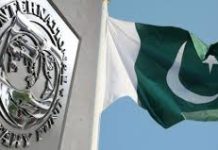By Muhammad Luqman
Pakistan has jumped up 28 places on the World Bank’s Ease of Doing Business Index and secured a place among the top 10 global business climate improvers, a development that is going to improve South Asian nation’s image at international level.
Pakistan carried out six reforms in the last one year that helped improve its ranking from 136 to 108, according to the World Bank’s annual report, ‘Ease of Doing Business 2020’, released on Thursday.
The economies with the most notable improvement are Saudi Arabia, Jordan, Togo, Bahrain, Tajikistan, Pakistan, Kuwait, China, India, and Nigeria.
While India remained top among South Asian nations, up 14 spots to 63, Pakistan also made a mark by climbing 28 positions and securing a place among the top 10 global business climate reformers and improving 28 positions in a year.
Pakistan’s government officials seem jubilant over the improvement of situation , saying that it would help attract more investment.
The government of Pakistan, under the leadership of the PM, is aggressively pursuing reforms to create ease of doing business, particularly to facilitate SMEs.@WorldBankSAsia @Illango_WB @ansukhera @investinpak @SECPakistan #PakistanMeansBusiness #PakistanIsReady @pid_gov pic.twitter.com/8kSbrBRtkV
— Emerging Pakistan (@Emergingpk) October 24, 2019
However, enforcing contracts and getting credit still remained weak areas for Pakistan despite Parliament enacting laws around three to four years ago. The two above-cited institutions delayed implementation of these laws that led to the rejection of two more reforms.
“This rise is significant and made possible by collective and coordinated actions of the Federal Government and Provincial Governments of Sindh and Punjab over the past year,” said Illango Patchamuthu, World Bank Country Director for Pakistan.
“The accelerated reform agenda has many noteworthy features to improve quality of regulations, reduce time and streamline processes. This momentum needs to be sustained in the coming years for Pakistan’s continued progress,” said Illango.
The Ease of Doing Business index is mostly used as a guide by foreign investors to learn more about a country, aiding decisions on pouring money into the economy.
Pakistan’s performance report was based on surveys carried out in Lahore and Karachi, and the results are based on work done from November 2018 to June 2019.
The report measures how close each economy is best to global practices in business regulations. On the measure of absolute progress towards best practices, Pakistan has improved the score to 61 from 52.8, suggesting the country did some remarkable work this time around and built on the reforms introduced in the previous year as well.
“Pakistan, another top improver, developed an ambitious reform strategy, setting up a national secretariat as well as a prime minister’s reform steering committee to ensure progress,” the report states.
Most of the programmed reforms evolved around the Doing Business indicators. Doing Business working groups have been set up at both municipal and provincial levels, it added.
Among other regional countries, Bhutan was at 89, Nepal (94), Sri Lanka (99), Maldives (147), Afghanistan (173) and Bangladesh (168).
The WB said that Pakistan made starting a business easier by expanding procedures available through the online one-stop shop. This reform applies to both Karachi and Lahore. Furthermore, Pakistan (Lahore) abolished the Labor Department registration fee.
“Pakistan also made paying taxes easier by introducing online payment modules for value-added tax and corporate income tax, and less costly by reducing the corporate income tax rate. This reform applies to both Karachi and Lahore,” read the report.
“Pakistan made getting electricity easier by enforcing service delivery time frames and by launching an online portal for new applications. Pakistan also increased the transparency of electricity tariff changes. This reform applies to both Karachi and Lahore.”















